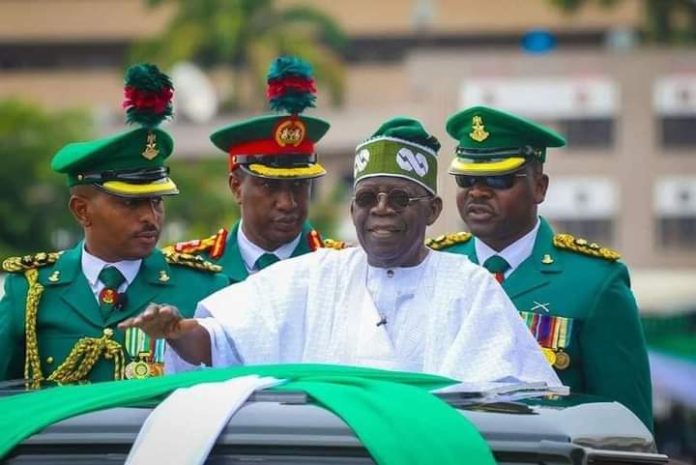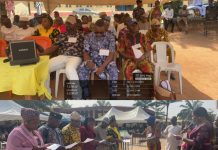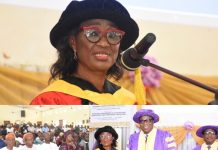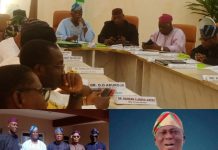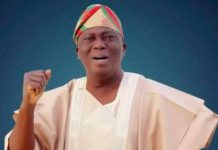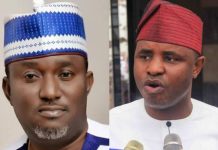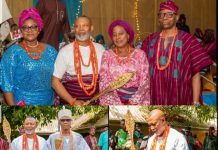
By Abdulwarees Solanke, Voice of Nigeria, Abuja
Happily, the new government of President Bola Ahmed Tinubu is distinguishing itself as a focussed and couragious one with pronouncements and appointments made so far, signalling a faster pace in our democratisation process.
Nigeria’s experience in democratization since the first republic shows that ours had been one of unnecessary muscle-flexing among tiers and arms of government when all should play complementary roles without prejudice to the norms of checks and balances, given the enormous challenges confronting the nation. Between the Federal and State governments in many instances, there is power or jurisdiction contestation while the local governments often claim subjugation under the states.
In the same vein, confrontation is not uncommon between the executive and legislative arms of government on areas that ordinarily demand understanding and cooperation. Realities also abound of corruption and interference in the judiciary, and consequently compromise or delay of justice and interpretation of the constitution, even on issues that should facility amity in our polity. More dangerous is the tendency for the politicization of the police, the armed forces and the anti-corruption agencies. If this is the scenario, it would of cause be difficult, if not impossible for development or reform to be facilitated in the country.
Simply, politicians in the country have been playing politics with development in the development policies government enunciates. Or better still, the nation has concentrated on playing politics while relegating development. It is this context that the success or failure of the Federal Government must be understood and evaluated as President Tinubu begins his tenure of office.
If the government policies anchored on a renewed hope must, therefore, be driven for national development, they must enjoy ownership of all stakeholders in the Nigerian Project while Federal Government projects must in similar vein find expression, support and partnership in all regional development initiatives in the country.
This is beyond party loyalty and political affiliation. This is about alignment and coordinated national development.
However, it is rather trite to say that the subsisting political culture and practices in Nigeria have been the bane of national cohesion and stability in the country, and that this unfortunate situation will unlikely be ameliorated except some critical but redemptive values are injected into the country’s value system, particularly in relation to party system.
Here, historical evaluation of party formation starting from the First Republic comes handy. A simple question: Which of the republic’s political parties had a national character? Even if any of them set out to be a national party, what was the extent of its penetration to other culture areas outside its primary base? There were the Northern People’s Congress, Action Group, Northern Elements Progressive Union, United Middle Belt Congress and National Council of Nigerian Citizen
But the Nigerian political history shows that in the strongholds of each of these parties during the pre-independence struggle and the immediate post-independence era, any other party that attempted to establish a presence in areas outside its primary base was considered an intruder, and membership of such party was treated with disdain.
This culture of intolerance played out in the nation’s successive democratic experiments when ethnic, tribal and creedal sentiments are called upon in power calculation and distribution. The first lesson here is that the Nigerian political system does not encourage, accommodate national spread. Secondly, her experience has shown that parties are often built around personalities and not on a defined structure that subjects individuals to the party or subjugates personal or tribal interests to the overriding national interest.
It seems the nation has entrenched a culture of political violence and exclusivity underlined by brigandage, opportunism, sectionalism, winner takes all, intolerance and hatred.
This is because we have not appropriated the understanding of competition and diversity. This is why political parties must be consistent in their ideologies, and such ideologies must be tested to have delivered dividends of democracy to the nation, even if at the lowest level of government.
But ideological consistency is a function of training, training that imbues party members with discipline and loyalty as a disciplined party member will not engage in acts inimical to the stability or image of the party. If aggrieved as a party loyalist, the recourse to internal party mechanisms to seek redress becomes paramount.
The absence of issue-based politics and ideologically consistent parties in the Nigerian polity has given rise to political prostitution and opportunism where the biggest spender, even if he lacks political maturity, organizational and leadership skills and party ideological training and discipline required of a mass movement that political parties are.
Nigeria always had a situation of individuals becoming bigger than the parties. Any difference or disagreement with an all-knowing, all-wise party chieftain, especially when such a big wig is the biggest financier or is the acknowledged initiator or leader. Therefore, such difference is often deemed disloyalty to the party and could earn one the status of dissident and ultimately, banishment.
The second lesson here is that the party system in Nigeria encourages the rise of the cult of personality, presenting the country as a closed political system that is intolerant of the true letters and spirit of democracy. Trailing off from the above is that in Nigerian party politics, political lineages and dynasties are easily created even when the descendants of a political leader lack the virtues and qualities of their progenitors.
It is enough to drop a name to clinch a slot just because of the filial attachment, even if remotely, to a notable political figure. That is why some candidates would get an endorsement or anoint without facing contest in the strict sense of competition. In this scenario, the lesson one can derive is that party and leadership recruitment in our political system needs to be more transparent and competitive with the greatest premium placed on merit.
Remarkably however the nation has not been very consistent in the process of leadership recruitment, nor have we successfully instituted a framework in which the best or the most qualified emerges in leadership. Often too, many leaders in the past come to power in chains, and therefore lack the will and capacity to act rationally and responsibly.
Which is why in 2007 when late President Umaru Musa Yar’Adua’ was elected into office, one was encouraged by his resolve and commitment to servant leadership, as underscored by his seven-point agenda, then.
But servant leadership entails more than serving the people. It is also an awareness of accountability to the Almighty, so that in the process of providing leadership, the public office holder is acutely conscious of the need to act courageously, justly, transparently and virtuously, not because he wants a second or a third term, or to be anointed for life, but because he sees leadership as trust from Allah. Woe to those who betray such a heavy trust.
From these lessons, we can also extrapolate further on political diversity and pluralism in the country. It is known that political parties exist to canvass interests and capture power in any polity. They compete for the same electorate, in spite of the political and demographic diversity, not vying for segmented citizenry with peculiar needs or niches in the economic sense.
So, how should this be done without offending the sensibilities of any segment of the electorate? The answer to this is that political contest must never take the form of a zero-sum game. Party politics must be issues-based with the exercise of force of logic, without denigrating the persons. It must offer a win-win prospect, and encourage bipartisanship.
When the private and public choices in a nation’s polity score low on these fronts, it certainly becomes difficult for her to sustain good governance, even if she erects her structures and institutions on a democratic system. Good governance one dare says is a function of leadership courage to act, and take responsibility for the action without consideration for praise, reward, positive or negative externalities.
In a 2015 article column Mirror of the Moment this analyst had noted that “there is an entrenched consciousness in the country that population size, need or merit cannot be the only determinants of representation and distribution of power and resources in the country as there is a growing awareness that no part of the country should be taken as superior in need or size than the other under any guise. This awareness has been at the root of different agitations in the country, and has informed some of the policies in place.”
Across Nigeria, people now canvass for an equal length of tenure of office among the six geopolitical zones. We have accepted that there should be equal number of representation both in government and in the parliament in a way that no region will have undue advantage over the other, and that we should have an equal share of resources. In my understanding of our equalitarian politics, however, we must accept the equal burden of neglect in every part of the country, equal blame for failure in governance, and also equal responsibility for the wastage of opportunities and advantages we have had.
In essence, one can generalize the notions of the minority, the marginalized and the disadvantaged to embody all the regions of the country. When a policy or programme seems to address the existing need of the real disadvantaged or marginalized, the culture in Nigeria is for the dominant group to feel threatened. And the metaphor of the “marginalization of the majority” surfaces. When a policy seems to take care of the future needs of a seemingly advantaged group, it is seen by those who do not have such need at all as the “consolidation of the advantaged”. Navigating through this complexity requires some strategic skills and sensitivity to the national mood.
Nigeria seems to have achieved a consensus on the number of geopolitical zones in the country and believe that a readjustment of the states in each region should reflect the equality. The implication is that interest groups are also likely to canvass for equal distribution of local government areas among the regions. Many agitations and demands by the respective groups in the country are reasonable and many policy initiatives to address them are profoundly scientific and rational, but mostly misunderstood by those that are supposed to benefit from them. The only reason is that the necessary political explanation and public engagement are lacking.
In the Nigerian equalitarian politics, the belief is that what you give A, B must also have regardless of whether B has a need for it or not. The metaphor of the national cake is illustrative of this phenomenon. Many states will actually prefer that the proverbial cake is sliced into 36 equal parts but none may ask if the equal share is the right or sufficient share for each state, manages its own share is likely to be the refrain even when the so-called equal slice might be too much or too little for some.
The problem here is that over the years, Nigerian politicians pursue equality without its concomitant utility, which is the reason for waste or underutilization of material and human resources in some cases and under-qualification or over-representation in others. The lessons are many for the nation as the Fourth Republic clocks 20 years of endurance. How does she manage her diversity and its associated challenges in a manner that when addressing the peculiarities of specific regions or parts of the country, stakeholders and interest groups have a mutual understanding that it is not conferring undue advantages over some regions or holding the other regions back?
As was canvassed in an article titled “A Giant’s Crawly Democracy” syndicated in the dailies a few weeks ago, this author believes the nature of a political system that Nigeria needs is one that recognizes consensus, where losers are also winners in some respect because of inclusiveness. Regardless of who sweep polls, a provision will still be available for the representation of the opposition, not as losers but as stakeholders in the Nigerian Project. The political arrangement that Nigeria needs must lighten heady competition. It must reduce tension and must restrict electioneering to election years, not distractive of good and orderly governance once a government is in place.
Political choice and alternatives in such system of government must conduce to rationality, objectivity, freedom, consciousness and conscience in the determination of who is It is generally believed that the first 16 years of the 4th Republic belonged to the wolves in the rapacity of PDP shredding the nation’s commonwealth.
This is seen as the justification for the sacking of President Ebele Goodluck Jonathan led-government in 2015. This is also what informed the resistance of the party’s return to power in the loss of former Vice President Atiku Abubakar in the last general election. On the election of President Buhari one resisted the temptation of congratulating him in an open letter published as an opinion in a number of national dailies because he still has on hand an unfinished assignment of leading Nigeria out of the woods, restoring pride in Nigerians, facilitating national cohesion and solidarity and inspiring the spirit of a new Nationalism among Nigerians.
Now, one can only pity and pray for President Bola Ahmed Tinubu in this arduous task of retrieving Nigeria from a challenging past of over six-decades and pulling her to a future of HOPE, ADVANCEMENT and PROSPERITY that these imperatives of leading the nation out of the woods imply for the Fourth Republic to endure. Ko easy!
President Bola Ahmed Tinubu needs to recruit a vibrant successor generation whose political philosophy will be rooted strictly on merit, experience, global exposure, distinguished public service, character and integrity to champion the ascension of the country on RENEWED HOPE because this might be the last opportunity the nation has for her endurance before the prognosis of “There was once a Nation” is validated.
Nigeria go survive, Insha Allah!
———
Abdulwarees Solanke
Abdulwarees, a 2007 Commonwealth Broadcasting Association scholar in Public Policy at the Universiti Brunei Darussalam is Deputy Director of Strategic Planning & Corporate Development at Voice of Nigeria, Abuja
korewarith@yahoo.com
08090585723
[24/6, 01:57] Abdulwarees: DEMOCRATISATION IN TINUBU’S TIME: HOW FAST OR FAR CAN WE GO?
By Abdulwarees Solanke, VOICE OF NIGERIA
Happily, the new government of President Bola Ahmed Tinubu is distinguishing itself as a focussed and couragious one with pronouncements and appointments made so far, signalling a faster pace in our democratisation process.
Nigeria’s experience in democratization since the first republic shows that ours had been one of unnecessary muscle-flexing among tiers and arms of government when all should play complementary roles without prejudice to the norms of checks and balances, given the enormous challenges confronting the nation. Between the Federal and State governments in many instances, there is power or jurisdiction contestation while the local governments often claim subjugation under the states.
In the same vein, confrontation is not uncommon between the executive and legislative arms of government on areas that ordinarily demand understanding and cooperation. Realities also abound of corruption and interference in the judiciary, and consequently compromise or delay of justice and interpretation of the constitution, even on issues that should facility amity in our polity. More dangerous is the tendency for the politicization of the police, the armed forces and the anti-corruption agencies. If this is the scenario, it would of cause be difficult, if not impossible for development or reform to be facilitated in the country.
Simply, politicians in the country have been playing politics with development in the development policies government enunciates. Or better still, the nation has concentrated on playing politics while relegating development. It is this context that the success or failure of the Federal Government must be understood and evaluated as President Tinubu begins his tenure of office.
If the government policies anchored on a renewed hope must, therefore, be driven for national development, they must enjoy ownership of all stakeholders in the Nigerian Project while Federal Government projects must in similar vein find expression, support and partnership in all regional development initiatives in the country.
This is beyond party loyalty and political affiliation. This is about alignment and coordinated national development.
However, it is rather trite to say that the subsisting political culture and practices in Nigeria have been the bane of national cohesion and stability in the country, and that this unfortunate situation will unlikely be ameliorated except some critical but redemptive values are injected into the country’s value system, particularly in relation to party system.
Here, historical evaluation of party formation starting from the First Republic comes handy. A simple question: Which of the republic’s political parties had a national character? Even if any of them set out to be a national party, what was the extent of its penetration to other culture areas outside its primary base? There were the Northern People’s Congress, Action Group, Northern Elements Progressive Union, United Middle Belt Congress and National Council of Nigerian Citizen
But the Nigerian political history shows that in the strongholds of each of these parties during the pre-independence struggle and the immediate post-independence era, any other party that attempted to establish a presence in areas outside its primary base was considered an intruder, and membership of such party was treated with disdain.
This culture of intolerance played out in the nation’s successive democratic experiments when ethnic, tribal and creedal sentiments are called upon in power calculation and distribution. The first lesson here is that the Nigerian political system does not encourage, accommodate national spread. Secondly, her experience has shown that parties are often built around personalities and not on a defined structure that subjects individuals to the party or subjugates personal or tribal interests to the overriding national interest.
It seems the nation has entrenched a culture of political violence and exclusivity underlined by brigandage, opportunism, sectionalism, winner takes all, intolerance and hatred.
This is because we have not appropriated the understanding of competition and diversity. This is why political parties must be consistent in their ideologies, and such ideologies must be tested to have delivered dividends of democracy to the nation, even if at the lowest level of government.
But ideological consistency is a function of training, training that imbues party members with discipline and loyalty as a disciplined party member will not engage in acts inimical to the stability or image of the party. If aggrieved as a party loyalist, the recourse to internal party mechanisms to seek redress becomes paramount.
The absence of issue-based politics and ideologically consistent parties in the Nigerian polity has given rise to political prostitution and opportunism where the biggest spender, even if he lacks political maturity, organizational and leadership skills and party ideological training and discipline required of a mass movement that political parties are.
Nigeria always had a situation of individuals becoming bigger than the parties. Any difference or disagreement with an all-knowing, all-wise party chieftain, especially when such a big wig is the biggest financier or is the acknowledged initiator or leader. Therefore, such difference is often deemed disloyalty to the party and could earn one the status of dissident and ultimately, banishment.
The second lesson here is that the party system in Nigeria encourages the rise of the cult of personality, presenting the country as a closed political system that is intolerant of the true letters and spirit of democracy. Trailing off from the above is that in Nigerian party politics, political lineages and dynasties are easily created even when the descendants of a political leader lack the virtues and qualities of their progenitors.
It is enough to drop a name to clinch a slot just because of the filial attachment, even if remotely, to a notable political figure. That is why some candidates would get an endorsement or anoint without facing contest in the strict sense of competition. In this scenario, the lesson one can derive is that party and leadership recruitment in our political system needs to be more transparent and competitive with the greatest premium placed on merit.
Remarkably however the nation has not been very consistent in the process of leadership recruitment, nor have we successfully instituted a framework in which the best or the most qualified emerges in leadership. Often too, many leaders in the past come to power in chains, and therefore lack the will and capacity to act rationally and responsibly.
Which is why in 2007 when late President Umaru Musa Yar’Adua’ was elected into office, one was encouraged by his resolve and commitment to servant leadership, as underscored by his seven-point agenda, then.
But servant leadership entails more than serving the people. It is also an awareness of accountability to the Almighty, so that in the process of providing leadership, the public office holder is acutely conscious of the need to act courageously, justly, transparently and virtuously, not because he wants a second or a third term, or to be anointed for life, but because he sees leadership as trust from Allah. Woe to those who betray such a heavy trust.
From these lessons, we can also extrapolate further on political diversity and pluralism in the country. It is known that political parties exist to canvass interests and capture power in any polity. They compete for the same electorate, in spite of the political and demographic diversity, not vying for segmented citizenry with peculiar needs or niches in the economic sense.
So, how should this be done without offending the sensibilities of any segment of the electorate? The answer to this is that political contest must never take the form of a zero-sum game. Party politics must be issues-based with the exercise of force of logic, without denigrating the persons. It must offer a win-win prospect, and encourage bipartisanship.
When the private and public choices in a nation’s polity score low on these fronts, it certainly becomes difficult for her to sustain good governance, even if she erects her structures and institutions on a democratic system. Good governance one dare says is a function of leadership courage to act, and take responsibility for the action without consideration for praise, reward, positive or negative externalities.
In a 2015 article column Mirror of the Moment this analyst had noted that “there is an entrenched consciousness in the country that population size, need or merit cannot be the only determinants of representation and distribution of power and resources in the country as there is a growing awareness that no part of the country should be taken as superior in need or size than the other under any guise. This awareness has been at the root of different agitations in the country, and has informed some of the policies in place.”
Across Nigeria, people now canvass for an equal length of tenure of office among the six geopolitical zones. We have accepted that there should be equal number of representation both in government and in the parliament in a way that no region will have undue advantage over the other, and that we should have an equal share of resources. In my understanding of our equalitarian politics, however, we must accept the equal burden of neglect in every part of the country, equal blame for failure in governance, and also equal responsibility for the wastage of opportunities and advantages we have had.
In essence, one can generalize the notions of the minority, the marginalized and the disadvantaged to embody all the regions of the country. When a policy or programme seems to address the existing need of the real disadvantaged or marginalized, the culture in Nigeria is for the dominant group to feel threatened. And the metaphor of the “marginalization of the majority” surfaces. When a policy seems to take care of the future needs of a seemingly advantaged group, it is seen by those who do not have such need at all as the “consolidation of the advantaged”. Navigating through this complexity requires some strategic skills and sensitivity to the national mood.
Nigeria seems to have achieved a consensus on the number of geopolitical zones in the country and believe that a readjustment of the states in each region should reflect the equality. The implication is that interest groups are also likely to canvass for equal distribution of local government areas among the regions. Many agitations and demands by the respective groups in the country are reasonable and many policy initiatives to address them are profoundly scientific and rational, but mostly misunderstood by those that are supposed to benefit from them. The only reason is that the necessary political explanation and public engagement are lacking.
In the Nigerian equalitarian politics, the belief is that what you give A, B must also have regardless of whether B has a need for it or not. The metaphor of the national cake is illustrative of this phenomenon. Many states will actually prefer that the proverbial cake is sliced into 36 equal parts but none may ask if the equal share is the right or sufficient share for each state, manages its own share is likely to be the refrain even when the so-called equal slice might be too much or too little for some.
The problem here is that over the years, Nigerian politicians pursue equality without its concomitant utility, which is the reason for waste or underutilization of material and human resources in some cases and under-qualification or over-representation in others. The lessons are many for the nation as the Fourth Republic clocks 20 years of endurance. How does she manage her diversity and its associated challenges in a manner that when addressing the peculiarities of specific regions or parts of the country, stakeholders and interest groups have a mutual understanding that it is not conferring undue advantages over some regions or holding the other regions back?
As was canvassed in an article titled “A Giant’s Crawly Democracy” syndicated in the dailies a few weeks ago, this author believes the nature of a political system that Nigeria needs is one that recognizes consensus, where losers are also winners in some respect because of inclusiveness. Regardless of who sweep polls, a provision will still be available for the representation of the opposition, not as losers but as stakeholders in the Nigerian Project. The political arrangement that Nigeria needs must lighten heady competition. It must reduce tension and must restrict electioneering to election years, not distractive of good and orderly governance once a government is in place.
Political choice and alternatives in such system of government must conduce to rationality, objectivity, freedom, consciousness and conscience in the determination of who is It is generally believed that the first 16 years of the 4th Republic belonged to the wolves in the rapacity of PDP shredding the nation’s commonwealth.
This is seen as the justification for the sacking of President Ebele Goodluck Jonathan led-government in 2015. This is also what informed the resistance of the party’s return to power in the loss of former Vice President Atiku Abubakar in the last general election. On the election of President Buhari one resisted the temptation of congratulating him in an open letter published as an opinion in a number of national dailies because he still has on hand an unfinished assignment, of leading Nigeria out of the woods, restoring pride in Nigerians, facilitating national cohesion and solidarity and inspiring the spirit of a new Nationalism among Nigerians.
Now, one can only pity and pray for President Bola Ahmed Tinubu in this arduous task of retrieving Nigeria from a challenging past six-decade odiousness and taking her to a future of HOPE, ADVANCEMENT and PROSPERITY that these imperatives of leading the nation out of the woods imply for the Fourth Republic to endure. Ko easy!
President Bola Ahmed Tinubu needs to recruit a vibrant successor generation whose political philosophy will be rooted strictly on merit, service and integrity to champion the ascension of the country on on RENEWED HOPE because this might be the last opportunity the nation has for her endurance before the prognosis of “There was once a Nation” is validated. Nigeria go survive, Insha Allah!
Abdulwarees, a 2007 Commonwealth Broadcasting Association scholar in Public Policy at the Universiti Brunei Darussalam is Deputy Director of Strategic Planning & Corporate Development at Voice of Nigeria, Abuja.
Views expressed by contributors are strictly personal and not of Precision Online Newspaper.


